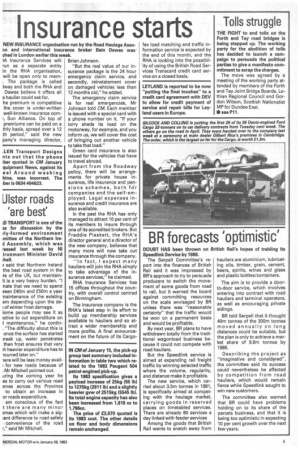BR forecasts 'optimistic'
Page 7

If you've noticed an error in this article please click here to report it so we can fix it.
Rail's hopes of trebling its The Serpell Committee's report into the finances of British Rail said it was impressed by BR's approach to try to persuade producers to switch the movement of some goods from road to rail, but it warned the board against committing resources on the scale envisaged by BR unless there was "reasonable certainty" that the traffic would be won on a permanent basis and would be profitable.
By next year, BR plans to have withdrawn totally from the traditional wagonload business because it could not compete with road hauliers.
But the Speedlink service is aimed at expanding rail freight traffic by winning selected traffic where the volume, regularity, and distance make it profitable.
The new service, which carried about 3.5m tonnes in 1981, is specifically aimed at competing with the haulage market, carrying goods in reserved places on timetabled services. There are already 80 services a day linked with feeder services Among the goods that British Rail wants to snatch away from hauliers are aluminium, lubricating oils, timber, grain, cement, beers, spirits, wines and glass and plastic bottles/containers.
The aim is to provide a doorto-door service, which involves entering into contract with road hauliers and terminal operators, as well as encouraging private sidings.
BR told Serpell that it thought 40m tonnes of the 300m tonnes moved annually on long distances could be suitable, but the plan is only to achieve a market share of 9.8m tonnes by 1986.
Describing the project as "imaginative and considered", the committee said its success could nevertheless be affected by competition from road hauliers, which would remain fierce while Speedlink sought to win new customers.
The committee also warned that BR could have problems holding on to its share of the parcels business, and that it is being too optimistic in expecting 10 per cent growth over the next few years.




















































































